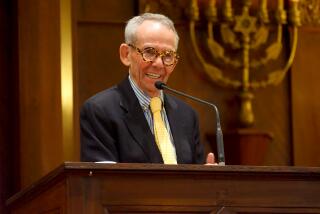Forgotten Treasures: A Symposium
- Share via
It is a truth not--well, not yet--universally acknowledged that the novel, as such, is in terminal decline. It had a fabulous run for about 150 years but for the last 50 years--no, longer. Other hybrids appear in its wakes: but the “classic” novel, written in the third-person singular, is passe.
But there are exceptions. And a stunning exception is the French Jean Dutourd’s “Les horreurs d’amour” (1962, I think; American edition: “The Horrors of Love” (1965?). One oddity about it is that it is written in the second-person singular; it is a long dialogue between two super-intelligent Frenchmen (both sides of Dutourd’s own character) walking through Paris, ambling in and out restaurants, reconstructing the pride and fall of a Parisian politician who gradually falls in love with his younger mistress and ends up in jail. It is a delicious and profound work of art, from beginning to end. Andre Maurois likened it to Proust; but in some ways it is better than Proust, sprightlier and more imaginative. The language itself is superb. Dutourd, now in his 70s, writes many books; of course some are better than others; he is also a columnist and dabbles in politics, sometimes unnecessarily, but no matter. But “The Horrors of Love” and another, entirely different Dutourd masterpiece, “Bon Beurre” (1952?) (“Best Butter,” also available in English), a satire, have a stunning recognition in common. This is that, yes, ideas count more than does matter; but (contrary to Hegel or Dostoevski or Nietzsche, whom Dutourd of course does not deign to mention) what men do to ideas is infinitely more important--and complex--than what ideas do to men. The villain of “Bon Beurre”--and, in a way, the protagonist of “The Horrors of Love”--are opportunists: but opportunities well beyond (and beneath) the Machiavellian prototype. They change their ideas constantly, which comes to them naturally. (In this way Dutourd, especially in “Best Butter,” is a more subtle satirist than Waugh: his villains wear and discard and change their ideas from time to time whereas Waugh’s villains are incarnations of the very same, usually stupid, ideas).
And now in what--not very accurately--is still called nonfiction (that boundary between what is fiction and nonfiction is corroding fast, like the Iron Curtain decades before its ultimate demise) something at least similar is the principal, and great contribution of the English thinker Owen Barfield (d. 1998) about whom C.S. Lewis, his friend, once said that “Owen is the greater thinker of us two.” T.S. Eliot about Barfield: His thought “is very far from the ordinary routes of intellectual shipping.” It may be summed up simply: Mind Precedes Matter. Reading Barfield all those massive mountains of materialism crumble to a smoking hulk. He hardly wrote anything before he was 50; his books are available without much difficulty. “History in English Words”; “Speaker’s Meaning” and “Saving the Appearances” are the first three to read.
More to Read
Sign up for our Book Club newsletter
Get the latest news, events and more from the Los Angeles Times Book Club, and help us get L.A. reading and talking.
You may occasionally receive promotional content from the Los Angeles Times.










